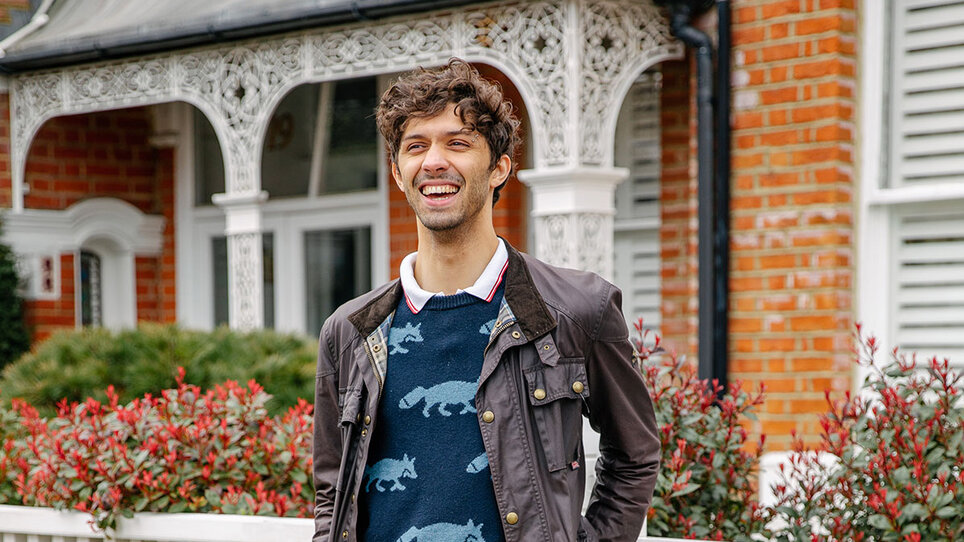
"For the longest time, I only ever considered my mental health when it couldn’t be ignored."
James Ward-Sinclair
- autistic advocate and founder of Autistic & Unapologetic
James Ward-Sinclair on mental health in the age of Zoom, discovering his love of exercise, and taking things one step at a time...
The past few years have been difficult for a lot of us. If you or someone you know is struggling with their mental health, we want you to know that you are not alone. We have plenty of mental health guides and resources on our website. If you would like more information on seeking professional support for your mental health, please visit our seeking help with mental health page. We hope you find these pages helpful.
To talk more about mental health, we caught up with one of our content creators, James Ward-Sinclair. James is an autistic advocate, fitness fanatic, and the brains behind ‘Autistic and Unapologetic’, a popular autism awareness blog.
Here, James writes about struggling with his mental health during the pandemic, how his new found love of fitness helped him get back on track, and his tips for aspiring autistic gym goers...
"When people asked me about my change in attitude, I would happily say that I was feeling down, but that it didn’t bother me because I was sure it would only be for a short while - spoilers: it wasn’t."
For the longest time, I only ever thought about my mental health when it couldn’t be ignored. When things were fine, I was fine, so who cared? But, when things went wrong, the negative thoughts that circled my mind were a little harder to push back, and I felt like I was stuck at a family event with a weird aunt who only wanted to point out my flaws.
However, at some point last year (when the world was at a particular low point), I couldn’t find the exit door to my engagements with poor mental health. I would wake up feeling tired, and leave the house sure I would return a nervous wreck at the end of the day. When people asked me about my change in attitude, I would happily say that I was feeling down, but that it didn’t bother me because I was sure it would only be for a short while - spoilers: it wasn’t.
Flash forward a few months later and, during one of the many, many Zoom calls which took place that year, I found myself quieter than usual, a lot sadder than normal and, in a move that is completely out of character for me, very, very teary.
Sure, I’ve cried in public before, but this wasn’t Lion King (the musical) or that one scene in the new Spider-man (yeah, you know the one). In my mind, this was weird because this, seemingly, was nothing.
As an autistic person who has written posts, given talks and tackled anxiety, stress and an eating disorder, you would have thought that diminishing mental health was something I would be aware of and ready for. I saw poor mental health as a temporary thing, and assumed that good old times would eventually turn things back.
“I now see that positive mental health can be something that elevates us, allowing us to be more creative, more resistant to the negative and less impacted by change.”
Perhaps that was my autistic brain protecting me from change, and bouncing me to a new norm whenever the old one gets out of whack, or maybe it was plain old denial. Either way, when last year did hit and the change never stopped, my mental health took a big hit and I realised I needed to hit back pronto.
I felt lost and I knew that to not feel this way, I had to set up a target to give me guidance during that challenging time. From what I read online I learnt that physical health really can impact your mental health and, so, I decided that my new goal was simple: I was going to get fit.
Now, why no one had ever told me just how autistic fitness can be, I will never know, but I quickly became obsessed with, well, everything: I loved learning how certain exercises are good for muscle growth, while some are good for endurance, I loved calculating how many reps of how much weight would reach the highest amount, I learnt the importance of rest and sleep for developing further and I spent so much time thinking about nutrition (and how to get the most proteins and vitamins without eating too much sugar and salt), that I could feel my now dusty PlayStation burning with jealousy.
It wasn’t long after that, building programmes to find the perfect balance was all I thought about and, inadvertently, I had stumbled upon a pastime which managed to hit on all the recommendations that mental health sites will tell you about (eg eating well, sleeping well, exercising regularly etc).
Please note: If you are not used to vigorous or challenging exercise or have not exercised for some time, make sure to ease into it gradually and go at a pace that suits. If you’re worried about exercising, you can always speak to your GP or talk to a fitness instructor.
“I think the key to better mental health is not always to doing things that make you them feel fine for a short while, but things which make you feel excellent for as long as possible.”
I have come to realise that my new hobby wasn’t something as simple as exorcising my poor mental health through exercise. It was showing me the other side of the coin, where among the episodes of negativity and otherwise mediocre mental health, I could also have great mental health - a discovery that I’m sure will surprise no one, felt amazing!
Personally, I think this realisation took so long because, as autistic people, we are too used to only seeing the negative side of mental health - wherein, at worst, it can result in sectioning and other nastiness and, at best, it occasionally comes along to kick us in the teeth and leave us feeling down in the dumps.
Since that day though, I now see that positive mental health can be something that elevates us, allowing us to be more creative, more resistant to the negative and less impacted by change (something which is especially useful to us autistic people). Of course, things are not perfect, and I still have bad days, but my mental health and attitude towards mental health has definitely improved.
I think the key to better mental health is not always doing things that make you feel fine for a short while, but things which make you feel excellent for as long as possible - whether that be taking up a new hobby, opting to engage more with people you have lost contact with or maybe, just maybe, setting yourself the goal to one day beat The Rock in an arm wrestle.
Enjoyed reading James's article?
Visit Autistic & Unapologetic to read more of James's work, including his experience of autism and eating challenges.

Related advice and support
Similar stories

"We all know that looking after our mental health is important, but sometimes it can feel almost impossible and being autistic can make this harder."
Emily Katy
- autistic mental health advocate
Read more

"I realised how low my self-esteem was from constantly feeling the need to mask my true self, in case others judged me negatively."
Dr Hannah Belcher
- autistic postdoctoral researcher and author
Read more

"How do we create a world that is more inclusive of autistic people?"
James Ward-Sinclair
- autistic advocate and founder of Autistic & Unapologetic
Read more

The Spectrum magazine
Explore one of the UK's largest collections of autistic art, poetry, and prose. The Spectrum magazine is created by and for autistic people, and is available both online and in print.

Stories from the Spectrum
Autistic people and their friends and families share their experiences of life on the spectrum. There are funny stories, thought-provoking stories, moving and challenging stories.






You are not alone
Join our community
Our online community is a place for autistic people and their families to meet like-minded people and share their experiences.
Join today